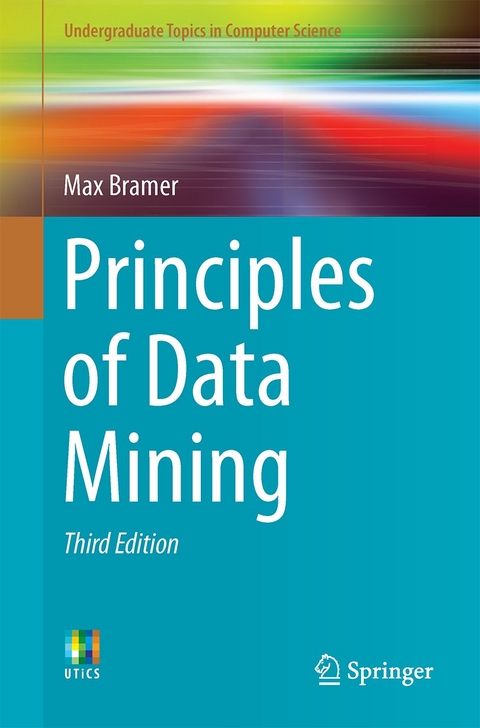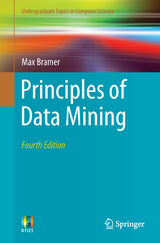
Principles of Data Mining
Springer London Ltd (Verlag)
978-1-4471-7306-9 (ISBN)
- Titel erscheint in neuer Auflage
- Artikel merken
This book explains and explores the principal techniques of Data Mining, the automatic extraction of implicit and potentially useful information from data, which is increasingly used in commercial, scientific and other application areas. It focuses on classification, association rule mining and clustering.
Each topic is clearly explained, with a focus on algorithms not mathematical formalism, and is illustrated by detailed worked examples. The book is written for readers without a strong background in mathematics or statistics and any formulae used are explained in detail.
It can be used as a textbook to support courses at undergraduate or postgraduate levels in a wide range of subjects including Computer Science, Business Studies, Marketing, Artificial Intelligence, Bioinformatics and Forensic Science.
As an aid to self study, this book aims to help general readers develop the necessary understanding of what is inside the 'black box' so they can use commercial data mining packages discriminatingly, as well as enabling advanced readers or academic researchers to understand or contribute to future technical advances in the field.
Each chapter has practical exercises to enable readers to check their progress. A full glossary of technical terms used is included.
This expanded third edition includes detailed descriptions of algorithms for classifying streaming data, both stationary data, where the underlying model is fixed, and data that is time-dependent, where the underlying model changes from time to time - a phenomenon known as concept drift.
Max Bramer is Emeritus Professor of Information Technology at the University of Portsmouth, England, Vice-President of the International Federation for Information Processing (IFIP) and Chair of the British Computer Society Specialist Group on Artificial Intelligence. He has been actively involved since the 1980s in the field that has since come to be called by names such as Data Mining, Knowledge Discovery in Databases, Big Data and Predictive Analytics. He has carried out many projects in the field, particularly in relation to automatic classification of data, and has published extensively in the technical literature. He has taught the subject to both undergraduate and postgraduate students for many years. Some of Max Bramer’s other Springer publications include: Research and Development in Intelligent Systems Artificial Intelligence in Theory and Practice Artificial Intelligence: an International Perspective Logic Programming with Prolog Web Programming with PHP and MySQL
Introduction to Data Mining.- Data for Data Mining.- Introduction to Classification: Naïve Bayes and Nearest Neighbour.- Using Decision Trees for Classification.- Decision Tree Induction: Using Entropy for Attribute Selection.- Decision Tree Induction: Using Frequency Tables for Attribute Selection.- Estimating the Predictive Accuracy of a Classifier.- Continuous Attributes.- Avoiding Overfitting of Decision Trees.- More About Entropy.- Inducing Modular Rules for Classification.- Measuring the Performance of a Classifier.- Dealing with Large Volumes of Data.- Ensemble Classification.- Comparing Classifiers.- Associate Rule Mining I.- Associate Rule Mining II.- Associate Rule Mining III.- Clustering.- Mining.- Classifying Streaming Data.- Classifying Streaming Data II: Time-dependent Data.- Appendix A – Essential Mathematics.- Appendix B – Datasets.- Appendix C – Sources of Further Information.- Appendix D – Glossary and Notation.- Appendix E – Solutions to Self-assessment Exercises.- Index.
| Erscheinungsdatum | 26.11.2016 |
|---|---|
| Reihe/Serie | Undergraduate Topics in Computer Science |
| Zusatzinfo | 123 Illustrations, black and white; XV, 526 p. 123 illus. |
| Verlagsort | England |
| Sprache | englisch |
| Maße | 155 x 235 mm |
| Gewicht | 9122 g |
| Themenwelt | Informatik ► Datenbanken ► Data Warehouse / Data Mining |
| Informatik ► Theorie / Studium ► Künstliche Intelligenz / Robotik | |
| Schlagworte | Associate Rule Mining • attribute selection • classification • Classifiers • Clustering • Data Mining • DataSets • decision trees • Entropy |
| ISBN-10 | 1-4471-7306-6 / 1447173066 |
| ISBN-13 | 978-1-4471-7306-9 / 9781447173069 |
| Zustand | Neuware |
| Informationen gemäß Produktsicherheitsverordnung (GPSR) | |
| Haben Sie eine Frage zum Produkt? |
aus dem Bereich



